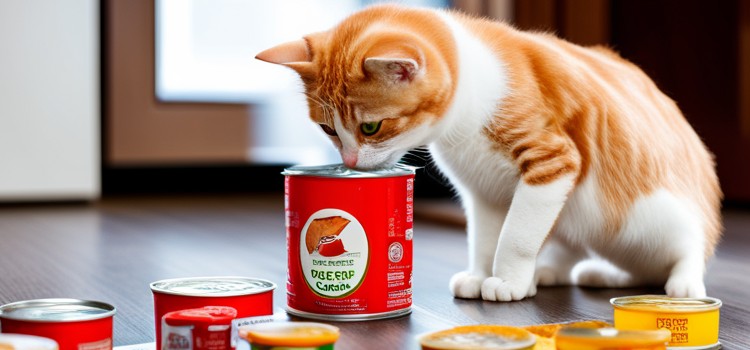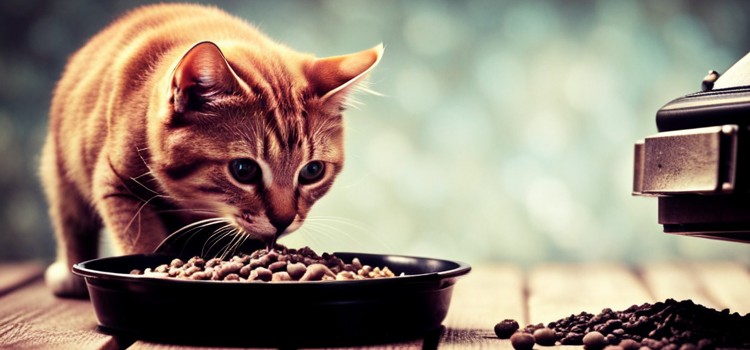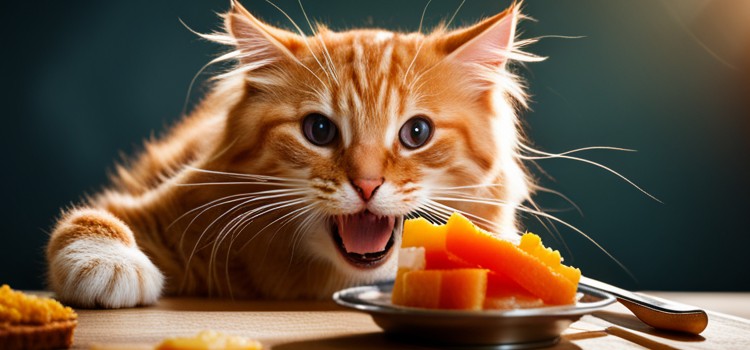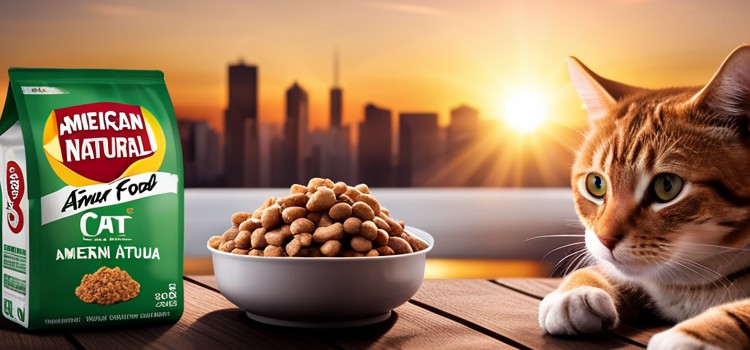As an Amazon Associate committed to the mission of improving the lives of our readers, Live-Clear.com receives a small commission from eligible purchases made through our affiliate links. This revenue enables us to keep producing insightful articles and other material.
No, you should not give evaporated milk to your cat, as it can cause digestive issues. Cats lack sufficient lactase, the enzyme necessary to digest lactose, in dairy products.
Evaporated milk is high in lactose, which could lead to upset stomach, diarrhea, or other gastrointestinal problems in cats. Instead of risking their health, providing cats with a diet that meets their nutritional needs is best. High-quality cat food and fresh water are essential for their well-being.
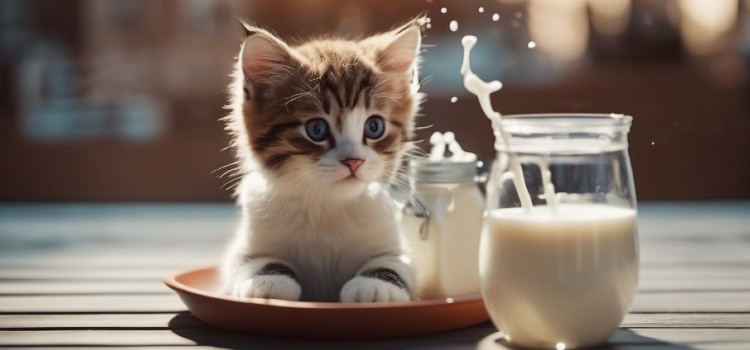
Consulting a veterinarian for proper guidance is advisable if you have concerns about their diet. cats require a balanced diet suited to their unique dietary requirements, so always opt for specialized cat food over human foods that may be harmful to them.
Evaporated Milk And Cats
When it comes to our feline friends, it’s no secret that they have specific dietary needs. As pet owners, we want to ensure that we are providing them with safe and healthy options. Evaporated milk is a versatile ingredient many people use in cooking and baking. But can cats have evaporated milk? Is it safe for them? Let’s explore evaporated milk’s composition, how it differs from regular milk, and whether it is suitable for our beloved cats.
The Composition Of Evaporated Milk
Evaporated milk is concentrated milk where about 60% of the water content has been removed, resulting in a thicker consistency and a slightly caramelized flavor due to the heating process. It contains the same components as regular milk, including proteins, fats, and carbohydrates, but in higher concentrations per serving due to reduced water content.
Why It Differs From Regular Milk
The key difference lies in the water content. Evaporated milk has a much lower water content, making it more calorie-dense. This concentration also means that evaporated milk contains higher levels of lactose, which may not be well-tolerated by some cats, especially those lactose intolerant.
Is Evaporated Milk Safe For Cats?
When it comes to our feline friends, it’s crucial to understand the potential risks and benefits of feeding them certain human foods, including evaporated milk. Many cat owners may wonder, “Can cats have evaporated milk?” The short answer is that while the occasional small taste of evaporated milk may not harm your cat, it’s essential to be aware of its potential risks.
Lactose Content And Cat Digestion
Cats primarily rely on their mother’s milk, which is rich in lactose, early in life. However, as they mature, many cats lose the ability to digest lactose, the sugar found in milk properly. Evaporated milk contains a high concentration of lactose, which can lead to digestive upset in lactose-intolerant cats. Even small quantities of lactose can cause gastrointestinal discomfort, including diarrhea and vomiting in cats.
Risk Of Digestive Upset In Cats
When it comes to offering evaporated milk to your cat, it’s essential to consider the potential risk of digestive upset. Cats may experience varying levels of lactose intolerance, and even a small amount of evaporated milk can disrupt their digestive system. Symptoms of lactose intolerance in cats include bloating, gas, and discomfort. This is why it’s generally recommended to avoid giving evaporated milk to cats, as it can lead to unnecessary health complications for your feline companion.
Alternatives To Evaporated Milk
When considering alternatives to evaporated milk for cats, it’s essential to find cat-friendly milk substitutes that provide similar benefits without the potential complications of lactose. Luckily, various options can be beneficial for your feline friend’s health and well-being.
Cat-friendly Milk Substitutes
Cat-friendly milk substitutes offer a lactose-free, nutritious solution for cats who may enjoy the taste of milk but cannot tolerate lactose. Here are some alternative milk options that can be suitable for cats:
- Unsweetened almond milk: This dairy-free alternative is low in calories and can be a safe choice for cats as long as they do not have nut allergies.
- Coconut milk: A rich and creamy option, it can be fed to cats in moderation, as it does not contain lactose.
- Goat’s milk: While it still contains lactose, goat’s milk is often easier for cats to digest than cow’s milk due to its smaller fat molecules and different proteins.
Benefits Of Lactose-free Options
Lactose-free options provide several benefits, especially for cats with lactose intolerance or sensitive stomachs. Here are some advantages of choosing lactose-free milk alternatives:
- Digestive health: Lactose-free milk alternatives can help prevent digestive discomfort and gastrointestinal issues in cats.
- Nutritional value: Many lactose-free milk substitutes offer essential nutrients, such as calcium and vitamins, that can support your cat’s overall health.
- Hydration: Providing cats with lactose-free milk options can contribute to their daily hydration, especially if they have a low water consumption.
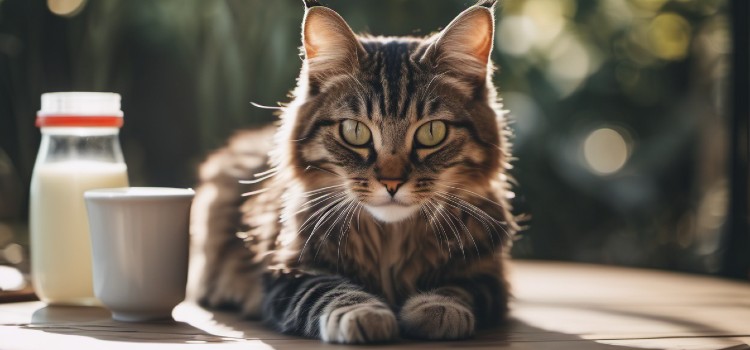
Evaporated Milk Nutritional Impact on Cats
When it comes to feeding our feline companions, it’s essential to be mindful of the nutritional impact of the food we offer. Many cat owners may wonder about the suitability of evaporated milk for their pets. In this section, we’ll delve into the nutritional impact of evaporated milk on cats, with a particular focus on the analysis of fat, protein, and carbohydrate content, as well as a comparison with a cat’s dietary needs.
Analysis Of Fat, Protein, And Carbohydrate Content
Let’s take a closer look at the nutritional composition of evaporated milk and understand how it aligns with a cat’s dietary requirements.
| Nutrient | Evaporated Milk (per 1 cup) |
|---|---|
| Fat | 20.6g |
| Protein | 24.2g |
| Carbohydrate | 25.8g |
Comparison With A Cat’s Dietary Needs
Now, let’s compare evaporated milk’s fat, protein, and carbohydrate content with a cat’s nutritional requirements.
- Bold Adult Cat’s Recommended Daily Intake:
- Fat: 9-16g.
- Protein: 30-35g.
- Carbohydrate: Minimal requirement.
- Bold Kitten’s Recommended Daily Intake:
- Fat: 16-25g.
- Protein: 50-60g.
- Carbohydrate: Minimal requirement.
Cat Dehydration Concerns
Cats are known for their unique dietary needs and preferences. Regarding hydration, it’s essential to understand how different foods and liquids can impact their overall health. Evaporated milk is a popular kitchen ingredient, but can cats have evaporated milk without risking dehydration?
How Milk Affects Hydration
Understanding how milk affects hydration is crucial when considering it as a potential option for your feline friend. While milk can provide some liquid, it’s important to note that it may not be the most effective way to keep your cat hydrated. The high lactose concentration in milk can lead to digestive issues in many cats, potentially exacerbating dehydration. Additionally, the fat content in evaporated milk can be complex for cats to digest, further impacting their hydration levels.
Signs Of Dehydration In Cats
Being able to recognize the signs of dehydration in cats is essential for maintaining their health. Some common indicators of dehydration in cats include:
- Dry or sticky gums.
- Reduced skin elasticity.
- Sunken eyes.
- Decreased energy and activity levels.
- Excessive panting.
If your cat exhibits any of these symptoms, seeking veterinary care promptly to address their hydration needs and identify any potential underlying health issues is crucial.
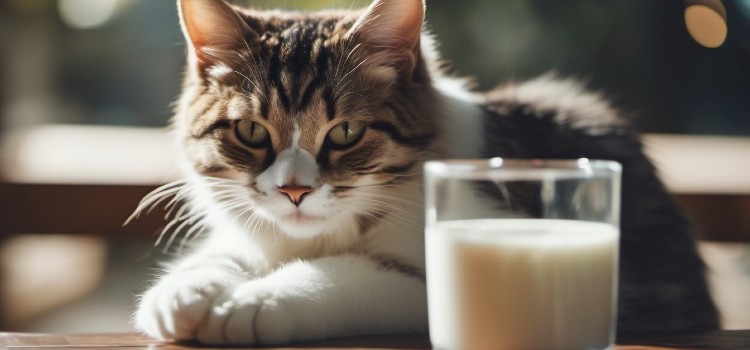
Can Cats Have Evaporated Milk Occasionally?
Evaporated milk is a concentrated form of milk that’s often used in cooking and baking. While it may be a tasty treat for humans, many cat owners wonder if it’s safe to give evaporated milk to their feline friends on an occasional basis. Let’s explore the pros and cons of infrequent indulgence and expert opinions on occasional treats for cats.
Pros And Cons Of Infrequent Indulgence
When it comes to giving cats evaporated milk as an occasional treat, it’s essential to understand the potential benefits and drawbacks. Pros of infrequent indulgence may include:
- Nutritional value: Evaporated milk contains essential nutrients like protein and calcium, which can be beneficial for a cat’s health in moderation.
- Treat option: Some cats may enjoy the taste of evaporated milk as an occasional indulgence, providing a special treat for them.
However, it’s essential to consider the cons of infrequent indulgence, such as:
- Lactose intolerance: Many cats are lactose intolerant, meaning they lack the enzymes needed to digest the lactose found in milk properly, which can lead to digestive issues.
- Caloric content: Evaporated milk is high in calories, potentially contributing to weight gain if given in excess.
Expert Opinions On Occasional Treats
When considering whether cats can have evaporated milk occasionally, seeking expert opinions is crucial. Veterinarians generally advise that while occasional small amounts of evaporated milk may not be harmful to some cats, it’s essential to consider the individual cat’s health and dietary needs. Always consult with a veterinarian before introducing new treats into a cat’s diet, especially if the cat has any underlying health conditions.
Introducing Milk To Your Cat
Milk is often a controversial topic when it comes to cats. While some cats handle it well, others may experience digestive issues due to lactose intolerance. It is important to introduce milk to your cat cautiously and monitor for any adverse reactions. Here’s a step-by-step guide to introducing new foods to your feline friend and how to monitor for allergic reactions or intolerance.
Step-by-step Guide To Introducing New Foods
When introducing a new food, such as evaporated milk, to your cat, it is crucial to do so gradually. Cats can be sensitive to sudden dietary changes, so take the following steps:
- Start by offering a small amount of diluted evaporated milk mixed with water.
- Observe your cat for signs of digestive upset, such as diarrhea or vomiting.
- If there are no adverse reactions, gradually increase the amount of evaporated milk over several days.
- Monitor your cat’s behavior and any changes in litter box habits closely.
Slowly introducing evaporated milk can gauge your cat’s tolerance and minimize any potential negative impact on their digestive system.
Monitoring For Allergic Reactions Or Intolerance
When giving your cat evaporated milk, it’s essential to be vigilant for any signs of allergic reactions or lactose intolerance. Keep an eye out for the following:
- Digestive upset: Diarrhea, vomiting, or constipation.
- Physical symptoms: Itching, hives, or swelling around the face.
- Respiratory issues: Sneezing, coughing, or difficulty breathing.
Monitoring your cat’s reaction to evaporated milk is essential in ensuring their well-being and comfort. Always prioritize your cat’s health when introducing new foods or treats.
Potential Long-term Effects Of Cats Have Evaporated Milk
Impact On Weight And Chronic Health Conditions
Cats are known to be lactose intolerant, and feeding them evaporated milk over a long period can lead to digestive issues. The high amount of fat and calories in evaporated milk can contribute to weight gain in cats, increasing the risk of obesity over time. Moreover, excessive consumption of evaporated milk may lead to the development of chronic health conditions such as diabetes and heart disease.
How To Recognize A Problematic Feeding Habit
To recognize if your cat’s feeding habit with evaporated milk is problematic, look out for symptoms of gastrointestinal distress such as diarrhea, vomiting, and bloating. Additionally, monitor your cat’s weight and observe any change in their energy levels and overall behavior, as this could be an indication of underlying health issues. Regular veterinary check-ups can help identify potential health concerns early on.
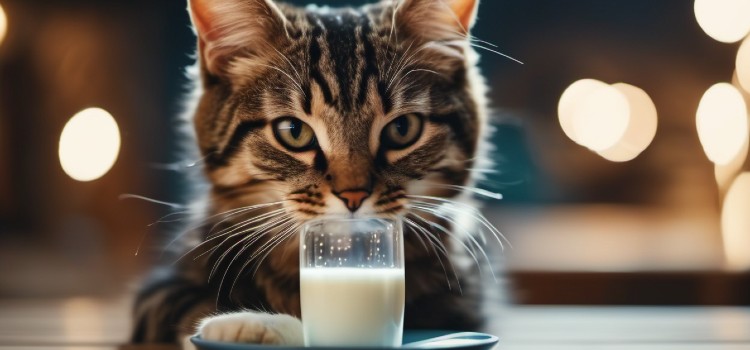
Conclusion
While evaporated milk isn’t toxic to cats in small amounts, it’s not recommended. Cats are lactose intolerant and can experience digestive issues. It’s best to offer them cat-specific milk or stick to their regular diet. Always consult your vet before introducing new foods to your feline friend. Introducing new foods to cats should always be done under the guidance of a veterinarian to ensure their health and well-being. It’s important to remember that each cat is unique and may have different dietary needs or sensitivities. By consulting with a vet, you can decide what is best for your cat’s needs.
Frequently Asked Questions Of Can Cats Have Evaporated Milk
Cats can have a small amount of evaporated milk as an occasional treat, but it should not become a regular part of their diet. Evaporated milk is high in fat and lactose, which can lead to digestive issues in cats.
Evaporated milk is safe for cats in small amounts but should not be a substitute for their regular diet. High in fat and lactose, it can cause stomach upset and obesity in cats if consumed excessively.
A small teaspoon of evaporated milk as an occasional treat should be safe for most cats. However, it’s important to monitor their reaction and consult a veterinarian if you have concerns about feeding evaporated milk to your cat.
Cats lack the necessary enzymes to digest the lactose in evaporated milk properly. Overconsumption can lead to digestive issues, including diarrhea and stomach discomfort in cats.
Instead of evaporated milk, consider offering your cat water, specially formulated cat milk, or lactose-free milk as an occasional treat. It’s important to ensure that any milk given to cats is in moderation and does not replace their balanced diet.
Evaporated milk is generally safe for cats, but it is essential to be aware of its potential risks. Cats lack sufficient lactase, the enzyme necessary to digest lactose in dairy products. Evaporated milk contains a high concentration of lactose, which can lead to digestive upset in lactose-intolerant cats. Even small quantities of lactose can cause gastrointestinal discomfort, including diarrhea and vomiting in cats.
Amazon and the Amazon logo are trademarks of Amazon.com, Inc, or its affiliates.
